
Hello, campers! Welcome to Challenge #3!
This challenge will help you to use our CORE Repository to its fullest potential. This will allow you to not only locate and download open access scholarly work, but it will also help you to increase your own readership.
To complete our CORE challenge you must:
- Find and download 1-3 CORE deposits that are relevant to your academic interests.
- Upload at least one scholarly work of your own and share it with the HC Summer Camp group.
The purpose behind this challenge is twofold. First, we hope that a greater awareness of the open access materials available in the CORE Repository will help you to locate helpful documents as you design your courses, build projects, and complete research in the future. Second, by uploading your work to CORE, you will increase your readership, strengthen your digital presence, help build our open access repository, and establish a direct connection between your HC profile and your work.
Locating Relevant CORE Deposits
There are multiple methods of searching through CORE deposits; for now, let’s use the most direct method. Click on the “CORE Repository” tab located on the left-hand column of the homescreen, directly below the Humanities Commons logo.
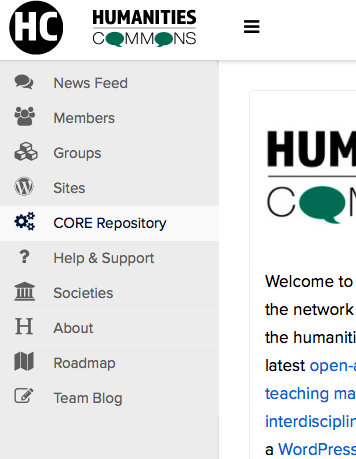
Once on the CORE Repository page, click the green button labeled “Find Open Access Materials,” located near the top right of your screen. This will take you to a searchable list of the entire CORE Repository. This page allows you to search through the repository using a number of different methods.

If you are searching for scholarly work that focus on a specific subject, select which fields you’d like to search using the appropriate dropdown menu and type in your search word into the text box. Click the magnifying glass, and you should see a list of CORE deposits that match your search specifications.
If you are looking for a specific type of scholarly work (ie: article, syllabus, book chapter, dissertation, podcast episode, etc.), use the filter options to the right of the page by clicking on the desired filters. For example, if I wanted to find syllabi for digital humanities courses, I would first click on the “Syllabus” link located under “Item Type” in the search filter list (you’ll have to select “More” a few times before you see this link), select “Subject” from the “Fields” menu, then type “Digital Humanities” into the search text box before clicking the magnifying glass. This search yields a list of digital humanities syllabi.
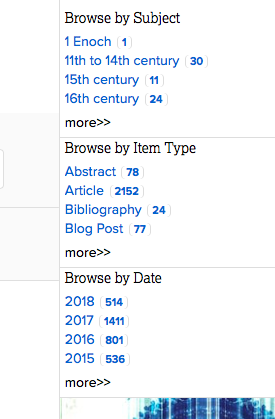
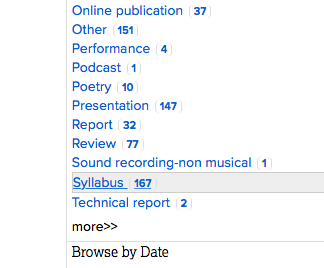

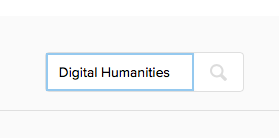
To find more information about a document, or to download it, users only need to click on the name of the document, which brings them to the document’s page. These pages typically contain an abstract of the work, a link to the author’s Humanities Commons profile, and other citational information, however this varies based on the personal preferences of the author. In order to download the document, go to the bottom of the page. There you will find a green button marked “Download.” You can also see how many times a document has been downloaded by using the counter located just below the Download button.
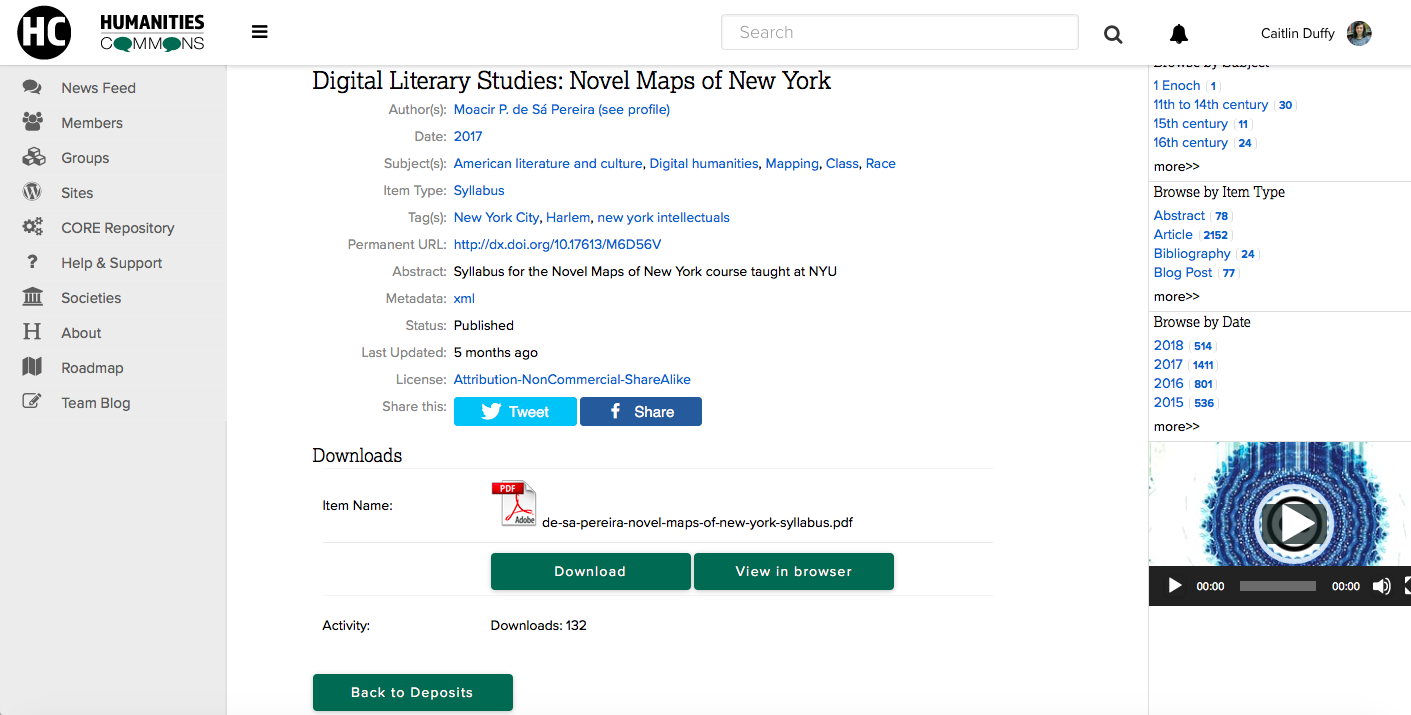
Uploading Work to CORE
What should I upload to CORE?
Before uploading your work to the CORE Repository, you first need to determine what you are able and willing to upload. As you decide, consider the work you have ready to share. This work could be something more traditional like a published article, seminar paper, conference paper, book chapter, or dissertation, or it could be considered gray literature, like a podcast episode, data set, video essay, or syllabus. In fact, this isn’t even a complete list of the various types of scholarly work we welcome into the CORE Repository. Basically, if you consider the work to be academic, we will most likely accept it into the repository.
If the work that you want to upload to CORE has already been published, you’ll need to make sure that you are allowed to share it as an open-access document. Check the author’s agreement you signed, to see if you retained copyright, or, if not, see if the publisher allows you to share a version of the article. You can also use SHERPA/RoMEO to check a journal’s open access and self-archiving policies (this link is also available on the CORE upload form).
Librarians, especially scholarly communications librarians, are another great resource to help you determine the sharing rights of your published document. Additionally, there is always the possibility of negotiating from the standard agreement to get more rights granted, which a scholarly communications librarian could help you achieve.
Why should I upload my work to CORE?
There are a number of excellent reasons to upload work to CORE:
- By uploading your work to CORE, you have guaranteed that it is archived and attributed to you.
- Once uploaded to CORE, your work is quickly available to a large audience. Humanities Commons allows others to download documents from the CORE Repository without requiring them to register for the Commons or provide any of their personal information.
- CORE deposits are easily discoverable because they are indexed by Google, Google Scholar, SHARE, Altmetric (Spoiler alert: Altmetric is the star of our next mini-challenge), and BASE-OA. Humanities Commons also allows you to share your uploads with specific groups so that the users who are most likely to read your work are alerted to it.
- Humanities Commons assigns a permanent identifier known as a DOI to each CORE deposit. DOIs provide persistant, citable metadata for scholarly and creative works, including gray literature such as blog posts, syllabi, data sets, presentations, and video/audio files. This guarantees attribution to creators of CORE content.
How do I upload my work to CORE?
Once you’ve decided upon a document to upload to CORE, return to the CORE page and select the “Upload Your Work” button near the top left of the page. This will take you to the New CORE Deposit form. Simply upload your document and add appropriate information to the text boxes and menus. Keep in mind that the only required fields are the ones marked with an asterisk (*).
Most of this form is pretty self-explanatory, however, there are a few areas of the form that may be helpful to explain further here.
At the very bottom of the form, it asks you to select which Creative Commons License you’d like to apply to your CORE upload. This is important because these licenses determine what others are allowed to do with your work and whether or not you must be attributed when your work is used. This page provides useful explanations for each Creative License.
Also at the bottom of the form is a question asking you whether or not you’d like to embargo your deposit. Some publications require you to wait a certain length of time before making your work available as open access material. If you choose to embargo a document, you’ll select the length of time after which the upload should become available. You can check SHERPA/RoMEO to determine whether your publisher requires you to embargo the document. Again, a scholarly communications librarian may also be able to help you with this.
How do I share this document with the HC Summer Camp group?
The New CORE Deposit form allows you to share your deposit with up to five groups. You will notice that you must be a member of the group in order to select it for this section of the form. Your deposit will appear in the CORE section of each of the groups you’ve chosen. For this challenge, make sure to share your work with the HC Summer Camp group!
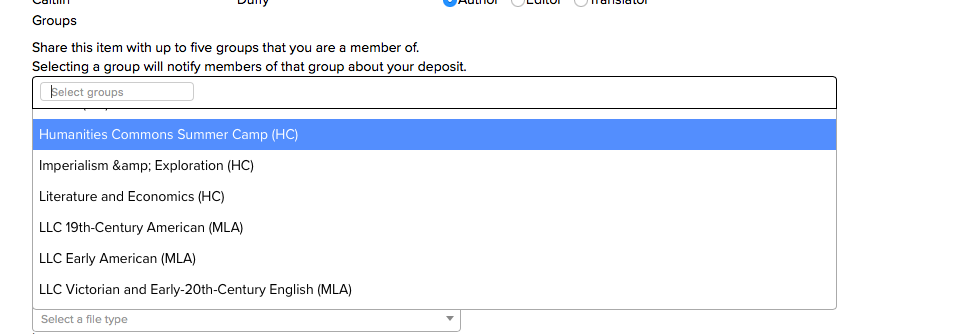
Once you’ve completed the form, click the green “Deposit” button at the bottom of the form.
Share your completed challenge
Once you’ve completed this challenge, let our group know your challenges and discoveries. Did you learn anything through this challenge? Which CORE deposits did you find and download? How did you find them? Did you come across any challenges or difficulties? Did you share your CORE deposit with the group? If so, what is it? How did you choose what to upload for this challenge?
If you’re on Twitter, please share that you’ve completed the third challenge using our #HCSummerCamper hashtag. You should also share your upload on social media!
I look forward to hearing your experiences and checking out your CORE deposits!
If you have any questions or if you run into any issues as you complete this challenge, fear not! Your camp director is here to help. Reach out to the Humanities Commons Summer Camp through any of the following contacts:
Humanities Commons: Post your question/concern as a new discussion thread in our HC Group.
Twitter: @humcommons
Email: CDuffy@mla.org or hello@hcommons.org
